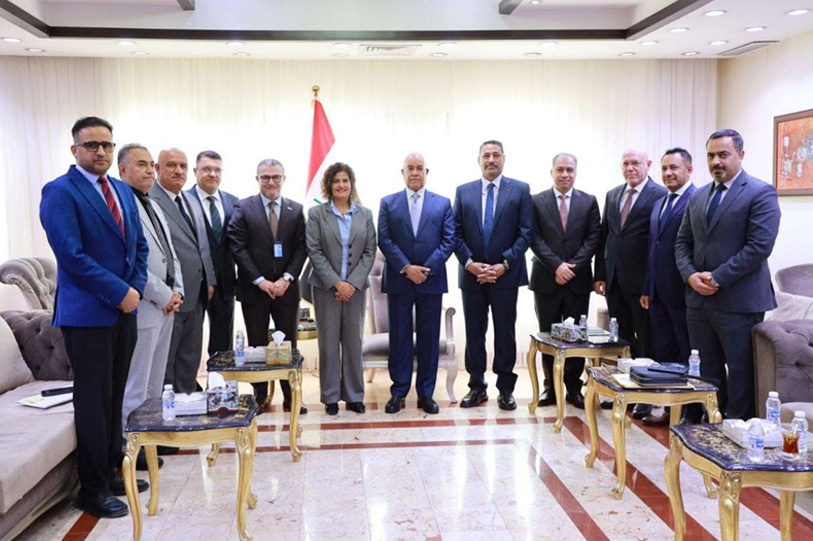 10 April 2025, Baghdad, Iraq – On the occasion of World Health Day, celebrated annually on 7 April, the anniversary of the founding of the World Health Organization (WHO) in 1948, Iraq’s Ministry of Health reaffirmed its partnership with WHO and ongoing commitment to provide comprehensive primary, secondary and specialized health care services.
10 April 2025, Baghdad, Iraq – On the occasion of World Health Day, celebrated annually on 7 April, the anniversary of the founding of the World Health Organization (WHO) in 1948, Iraq’s Ministry of Health reaffirmed its partnership with WHO and ongoing commitment to provide comprehensive primary, secondary and specialized health care services.
The Ministry has made significant advances in health insurance, endorsing the Health Insurance Law and piloting its implementation in Baghdad. In 2023, as part of the Law’s first phase implementation, 300 000 people were covered through 23 public institutions. By 2024, the number of people insured had increased to 776 000, through 27 public institutions and a growing number of private health care facilities.
New health facilities have been built, and others rehabilitated, across the country. The expansion includes:
the opening of 15 new public hospitals (general and specialized), 116 primary health care centres and homes, 82 popular medical clinics and 43 specialized centres for dialysis, cancer, diabetes, endocrinology, tuberculosis, haematology, dental care and prosthetics manufacturing and supply;
the rehabilitation and expansion of 164 hospitals, 21 specialized health centres, 86 primary care centres, and 28 ongoing health projects across provinces; and
3 new health sectors, 39 main centres and 40 satellite centres for primary health care.
A total of 385 new health projects are currently underway across Baghdad and other provinces, many of which are nearing completion.
To develop primary health care services across Baghdad and other provinces, the Ministry has:
adopted the family health approach in 48 health centres;
activated 56 multidisciplinary health centres;
established 160 monitoring sites for antimicrobial consumption in government institutions;
expanded older person-friendly health centres;
opened 26 geriatric clinics in public hospitals;
increased the number of neonatal screening centres to 1090;
launched and equipped school health units in 187 schools across Iraq;
implemented 2 national campaigns to screen students and assess school environments, the first in 2023 and the second in 2024;
conducted a national measles-rubella vaccination campaign in 2024;
screened detention centres for tuberculosis and HIV; and
rolled out the electronic health governance system (DHIS2) across 1848 health institutions.
In addition, early childhood development services are delivered through 709 primary health centres, 68 mobile clinics serve remote areas of the country and 127 outlets, including 8 centres of excellence, offer family planning services.
Iraq’s advances in the field of public health have garnered national and international recognition. The country has been declared free from trachoma. It is the first country globally to transition from Global Polio Eradication Initiative support to national ownership, and the first to receive dual international accreditation for its Field Epidemiology Training Programme (FETP) at both the advanced and intermediate levels.
Several national laboratories within the Central Public Health Laboratory have gained accreditation, including those for microbiology, clinical chemistry, measles and rubella, influenza, polio, bacteriology and newborn screening. Iraq has also joined the Alliance for Transformative Action on Climate and Health,
The Ministry continues to provide preventive services for communicable diseases, public health inspections and health education and promotion across all primary health care centres.
International companies have been contracted to manage 7 modern hospitals – Al-Shaab Hospital (Baghdad), Imam Al-Sadiq Hospital (Babil), Al-Sayyab Hospital (Basra), Imam Al-Hassan Al-Mujtaba Hospital (Karbala), Martyr Al-Hakim Hospital (Maysan), Al-Najaf Al-Ashraf Hospital (Najaf) and Al-Nasiriyah Hospital (Dhi Qar).
Significant progress has been achieved in maternal, neonatal and child health, the focus of this year’s World Health Day. Between 2018–2023, maternal mortality fell to 29.6 per 100 000 live births, neonatal mortality was reduced to 10.5 per 1000 and under-5 mortality fell to 19.7 per 1000 live births,
Mortality from noncommunicable diseases (NCDs) between ages 30–70 fell to 2.7, and mortality from tuberculosis has been halved since 2015. Iraq has also maintained the elimination of malaria, polio and schistosomiasis.
Work is ongoing to expand maternal and neonatal services in remote and conflict-affected areas, increase national investment in reproductive, maternal and child health programmes, develop and implement a comprehensive national strategy under the universal health coverage framework, launch digital tools to monitor pregnancy and child health, and strengthen community awareness and partnerships with civil society and local stakeholders.
With support from WHO and partners, Iraq is also working on strengthening health information and early warning systems, enhancing the capacity and protection of health workers, and developing strategies to address climate change, mental health, antimicrobial resistance and emergency preparedness.




